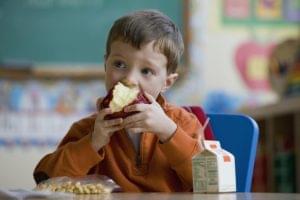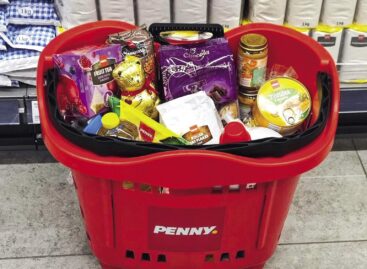500 thousand servings of lunch saved from school canteens
The unique school lunch rescue program of the Hungarian Food Bank Association has reached the milestone of half a million meals. In the initiative, which was launched in the fall of 2023, leftover lunches from canteens are given to those in need through charitable organizations operating near schools. In two years, they were able to distribute food worth 400 million forints among people and families in need. And this is just the beginning. 27 schools and public catering establishments have already joined the program.
 Those lunches that children do not ask for in school canteens may get a second chance. Until now, these untouched portions have mostly been destroyed, but recently they may even reach people in need. The essential methodological guide for this was published by the Hungarian Food Bank Association at the end of 2022 in cooperation with the National Food Chain Safety Office (NÉBIH) under the auspices of the Food Value Forum. This is an important step, as according to some surveys, there are schools where more than ten percent of the cooked food prepared regularly ends up as food waste.
Those lunches that children do not ask for in school canteens may get a second chance. Until now, these untouched portions have mostly been destroyed, but recently they may even reach people in need. The essential methodological guide for this was published by the Hungarian Food Bank Association at the end of 2022 in cooperation with the National Food Chain Safety Office (NÉBIH) under the auspices of the Food Value Forum. This is an important step, as according to some surveys, there are schools where more than ten percent of the cooked food prepared regularly ends up as food waste.
500 thousand leftover lunches have already been saved from destruction
The potential of lunch saving is well demonstrated by the fact that, although the program is still in its infancy, it has already managed to connect 27 schools and public catering kitchens and save half a million lunches in two years. On the occasion of the milestone, on Tuesday afternoon, November 25, the partners collaborating in the program jointly saved the five hundred thousandth lunch in a donation box at the canteen of the Sándor Csoma Bilingual Elementary School in Kőrösi in Budapest.
“We saved 24 portions of egg soup, as well as 75 portions of pumpkin stew and dinosaur snacks from this school today. Some of these remained in the kitchen because the parents of the missing students were unable to cancel their meals in time, and of course there were also children who simply do not like these foods, so they did not ask for them. However, there are many people outside the school who would be happy to eat them, but cannot afford such a lunch. We can help them with this program”
– said András Nagygyörgy, the Food Bank’s director of external relations.
They also shape the students’ attitudes
Related to the topic of lunch rescue, students were able to participate in a special lesson at the school on Tuesday, which gave them practical knowledge about preventing waste and sustainable eating and diet. The presentation also commemorated the fact that the global advocate for the topic, the Food and Agriculture Organization of the United Nations (FAO), is celebrating its 80th anniversary this year.
“The Food Bank’s lunch rescue program is useful not only because it provides food for the needy. Being present in schools also offers an opportunity to shape the students’ attitudes”
– said Gyula Kasza, head of the Department of Applied Food Science at the University of Veterinary Medicine, who himself and his colleagues took a pioneering role in developing the lunch rescue methodology.
“A social program has been underway in Hungary since 2016 to reduce food waste. The work has been supported by research and food waste surveys since the beginning, so it is clear where we have already achieved results and where we still need to strengthen our efforts. Anyone who is curious about how sustainable their household is can join our research, which is now starting, on the website of the Maradék Nélkül Foundation.”
They are also doing good for nature
Few people know that food waste is one of the most serious social, economic and environmental challenges of our time. According to FAO data, one third of the food produced on our planet is wasted every year, which is especially worrying in light of the fact that nearly seven hundred million people in the world are hungry. Meanwhile, 8 percent of the greenhouse gases that cause climate change can also be linked to food waste.
“When we throw away food, we also waste the resources used to produce it – soil, water, biodiversity and energy – which we often don’t even think about,”
– said Viorel Gutu, FAO Assistant Director-General and Regional Representative for Europe and Central Asia.
“That’s why it’s so important that we, as individuals, families and society, are aware of the problem and take responsibility for the solution. Local initiatives like this, and educating people – and more importantly, children – about the problem, can bring us closer to eliminating food waste.”
Easier for schools and municipalities too
The key to saving school lunches is to comply with food safety standards throughout the entire donation process. At the end of the workday, kitchen workers portion out the untouched lunch into food delivery boxes.
Related news
PENNY builds on partnership-based CSR
🎧 Hallgasd a cikket: Lejátszás Szünet Folytatás Leállítás Nyelv: Auto…
Read more >The risk of introduction is increasing – the Japanese beetle has already appeared in Croatia
🎧 Hallgasd a cikket: Lejátszás Szünet Folytatás Leállítás Nyelv: Auto…
Read more >Related news
II. Green Gastronomy – Marketing Communication Workshop organized by the MMSZ HoReCa and Green Section
🎧 Hallgasd a cikket: Lejátszás Szünet Folytatás Leállítás Nyelv: Auto…
Read more >Retail sales of organic products in Hungary increased by 13.9% – our country is the second fastest growing market in the European Union
🎧 Hallgasd a cikket: Lejátszás Szünet Folytatás Leállítás Nyelv: Auto…
Read more >








